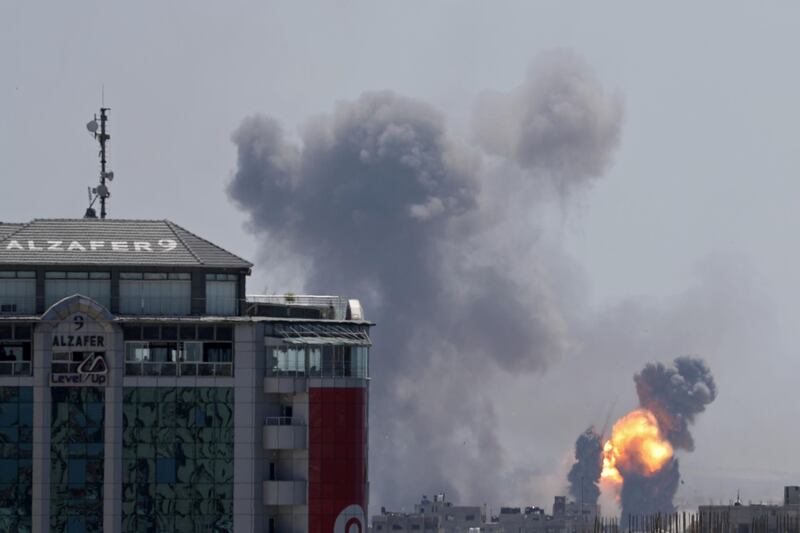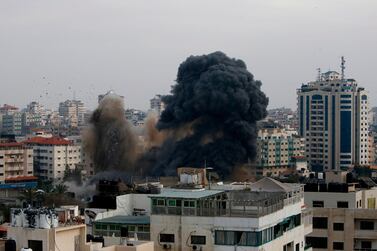On Sunday evening, it looked like war. By early Monday morning, around the same time that Palestinians kicked off the first fast for this Ramadan, the rockets and missiles racing between Israel and Gaza ceased.
After three days of the deadliest violence since the 2014 war, ruling Hamas in Gaza announced they had reached a ceasefire deal brokered by Egypt and international mediators. Israel, which does not formally comment on negotiations with militant factions in Gaza that they consider to be terrorist organisations, signalled the same by announcing it was lifting its security measures in the south.
Still, it’s another precarious calm.
Under the terms of the agreement, Israel has one week to meet its side of the deal, which includes lifting restrictions on some goods into besieged Gaza, according to Israeli and Arabic media reports. Hamas in turn has pledged to halt all violence and keep weekly protests along the buffer zone peaceful.
The deal includes Israel lifting restrictions on dual-use goods, those that can be used for civilian and military purposes, into Gaza, increasing exports from the coastal territory, and expanding Gaza’s fishing zone, according to Israeli media reports.
Israel has also reportedly agreed to once again facilitate the transfer of Qatari money into Gaza in order to fund United Nations related cash-for-work programs, cash-strapped Hamas government employees, and small grants for struggling families.
Both sides have just about been here before. Last November, Egyptian and international mediators negotiated another ceasefire deal after a different flare up. In early April, after another escalation, Israel agreed to expand part of Gaza’s fishing zone to 15 nautical miles, but then reduced and cancelled the concession after Hamas fired rockets.
Qatari money – and Israel sometimes blocking it for leverage – has also become part of the deadly dance between the two. On Tuesday, Qatar pledged another $480 million to the West Bank and Gaza.
Israel and Hamas in Gaza have been locked in a stalemated, bloody conflict since the militant group ousted its rival Palestinian Authority from the strip in 2007 and Israel instated a land and sea blockade.
Three subsequent wars with Israel have devastated Gaza: the UN has warned it is de-developing and could be “uninhabitable” by 2020. Israeli Prime Minister Benjamin Netanyahu, who faces a looming corruption indictment, has also faced repeated flak from his opponents for not fully stopping Hamas and rocket fire long-term.
In this weekend’s case, though, both sides appeared invested in de-escalating the situation. With Ramadan about to start, an all-out war would be particularly painful for Palestinians in Gaza and the already-teetering and unpopular Hamas government. Israel in turn celebrates its Memorial Day and Independence Day this week, while international contestants are already gathering in Tel Aviv – which Hamas’ and Islamic Jihad’s long-range missiles can in theory hit – for next week’s Eurovision competition.
“Neither Hamas nor Israel wants a new war,” Tareq Baconi of International Crisis Group wrote in a brief Tuesday. “In past escalations, as in the current one, Hamas and Islamic Jihad have relied on rocket fire to try to compel Israel to meet its ceasefire commitments and lessen the blockade.”
Still, the leader of Islamic Jihad, an extremist militant group and the second largest in Gaza, told Lebanese media on Tuesday that this was just “preparation for the greater battle”.
Israeli officials have also suggested that the truce is only temporary.
“The campaign is not over and requires patience and judgment,” Mr Netanyahu said in a statement on Monday. “We are preparing to continue. The goal was and remains to ensure the peace and security of the residents of the south.”
Politically, though, the split between Hamas and the Ramallah-based Palestinian Authority is in both Mr Netanyahu and Hamas’ interest as it lessons the chances of a two-state solution negotiated with the PA, which they both oppose.
“Israel's Gaza policy is akin to holding a person tightly by the neck: Israel is trying to maintain a choke-hold that applies pressure yet isn't too tight to cause the choked to start hitting Israel back,” researcher Elizabeth Tsurkov wrote on Twitter.
“The problem: those being choked are two million civilians, not just Hamas.”






